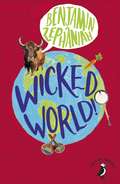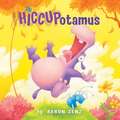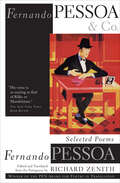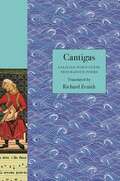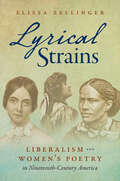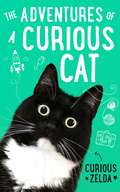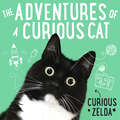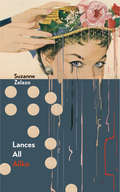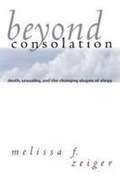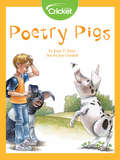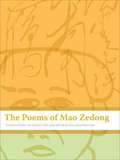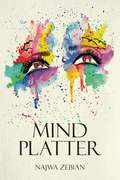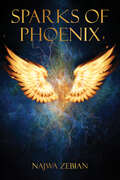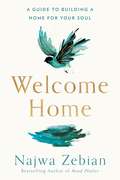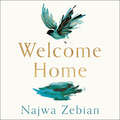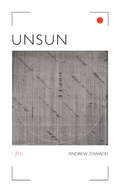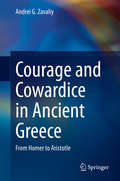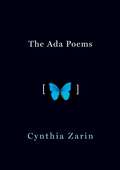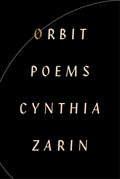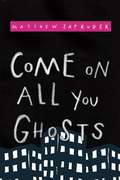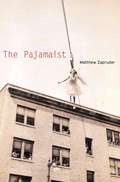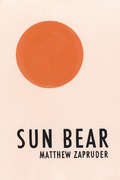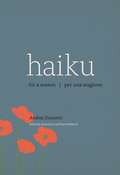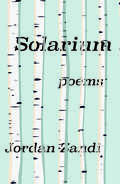- Table View
- List View
Wicked World! (Puffin Poetry)
by Benjamin ZephaniahWelcome to the wild and wicked words of Benjamin Zephaniah. You'll find loads of cool people who make up our world in this rapping, happening hip-hop collection. From the South Pole to Mongolia and the Himalayas, this is a real world tour of poems about people and places, cultures and nationalities across our planet.Includes poems about Inuits, Celts, the history of Britain, Maories, the Dalai Lama, the North and South Poles, and much more - a rhyming round-the-world trip.Poems that bounce up from the page and demand to be read, rapped, sung and hip-hopped aloud - Independent on Sunday
The Hiccupotamus
by Aaron ZenzCalamity ensues when an elephant, a centipede, and a rhinoceros try finding a cure for hippo's colossal case of hiccups. Cast Bios The part of the Hiccupotamus was played by veteran hippo actor Hank Polowski. Due to a paralyzing fear of fish, some of his scenes in this book were performed by a crew of stunt doubles. Bartholomew Poppins has appeared in over 100 roles in his picture book career. He still dreams of landing a leading part, but is proud of his work in The Hiccupotamus and his cameo as "something squishy" in Mr. Binkers Steps in Something Squishy. Many considered it a risk casting an unknown in the significant elephant role. But it would appear that pachyderm Katie McMurphy has a promising career ahead of her. Following a serious allergic reaction, however, she is currently turning down all parts that involve the use of frosting. Samu Ti speaks no English, which created occasional confusion during his work on The Hiccupotamus. Author Aaron Zenz recalls the time the script called for the centipede to pour cement, but instead Samu began purring like a cat. "The more I shouted 'Pour! Pour!' the louder he'd purr!" This is the final role for Dennis Flott. He is retiring to a small bee-keeping community in North Western Idaho. Good luck, Dennis! We wish you all the best. The part of the buffalo was played by a ground squirrel named Arlo. It took 14 hours in the make-up chair to get him ready each day. Unfortunately, that continually made for a very short window of opportunity to use him in costume.
Fernando Pessoa & Co.: Selected Poems
by Richard Zenith Fernando PessoaFernando Pessoa (1888–1935) - a poet who lived most his life in Lisbon, Portugal, and who died in obscurity there - has in recent years gained international recognition as one of the greatest writers of the twentieth century. Now Richard Zenith has collected in a single volume all the major poetry of one of the most extraordinary poetic talents the century has produced (Microsoft Network's Reading Forum). Fernando Pessoa was as much a creator of personas as he was of poetry, prose, and criticism. He wrote under numerous heteronyms, literary alter egos with fully fleshed identities and writing styles, who supported and criticized each other's work in the margins of his drafts and in the literary journals of the time. From spare minimalism to a revolutionary exuberance that recalls Leaves of Grass, Pessoa's oeuvre was radically new and anticipated contemporary literary concerns to an unnerving degree. The first comprehensive edition of Pessoa's poetry in the English language, Fernando Pessoa & Co. is a work of extraordinary depth and poetic precision. Zenith's selection of Pessoa is a beautiful one-volume course in the soul of the twentieth century. — Booklist
Cantigas: Galician-Portuguese Troubadour Poems (The Lockert Library of Poetry in Translation #140)
by Richard ZenithA bilingual volume that reveals an intriguing world of courtly love and satire in medieval Portugal and SpainThe rich tradition of troubadour poetry in western Iberia had all but vanished from history until the discovery of several ancient cancioneiros, or songbooks, in the nineteenth century. These compendiums revealed close to 1,700 songs, or cantigas, composed by around 150 troubadours from Galicia, Portugal, and Castile in the thirteenth and early fourteenth centuries. In Cantigas, award-winning translator Richard Zenith presents a delightful selection of 124 of these poems in English versions that preserve the musical quality of the originals, which are featured on facing pages. By turns romantic, spiritual, ironic, misogynist, and feminist, these lyrics paint a vibrant picture of their time and place, surprising us with attitudes and behaviors that are both alien and familiar.The book includes the three major kinds of cantigas. While cantigas de amor (love poems in the voice of men) were largely inspired by the troubadour poetry of southern France, cantigas de amigo (love poems voiced by women) derived from a unique native oral tradition in which the narrator pines after her beloved, sings his praises, or mocks him. In turn, cantigas de escárnio are satiric, and sometimes outrageously obscene, lyrics whose targets include aristocrats, corrupt clergy, promiscuous women, and homosexuals.Complete with an illuminating introduction on the history of the cantigas, their poetic characteristics, and the men who composed and performed them, this engaging volume is filled with exuberant and unexpected poems.
Lyrical Strains: Liberalism and Women's Poetry in Nineteenth-Century America
by Elissa ZellingerIn this book, Elissa Zellinger analyzes both political philosophy and poetic theory in order to chronicle the consolidation of the modern lyric and the liberal subject across the long nineteenth century. In the nineteenth-century United States, both liberalism and lyric sought self-definition by practicing techniques of exclusion. Liberalism was a political philosophy whose supposed universals were limited to white men and created by omitting women, the enslaved, and Native peoples. The conventions of poetic reception only redoubled the sense that liberal selfhood defined its boundaries by refusing raced and gendered others. Yet Zellinger argues that it is precisely the poetics of the excluded that offer insights into the dynamic processes that came to form the modern liberal and lyric subjects. She examines poets—Frances Sargent Osgood, Elizabeth Oakes Smith, Frances Ellen Watkins Harper, Edna St. Vincent Millay, and E. Pauline Johnson—whose work uses lyric practices to contest the very assumptions about selfhood responsible for denying them the political and social freedoms enjoyed by full liberal subjects. In its consideration of politics and poetics, this project offers a new approach to genre and gender that will help shape the field of nineteenth-century American literary studies.
The Adventures of a Curious Cat: wit and wisdom from Curious Zelda, purrfect for cats and their humans
by Curious Zelda'A purrfect gift for a loved one with a special affinity for the feline' 'An absolute must for any cat lover''Curiosity is more than a desire to discover. It's a lifestyle, and a purrvilege. It's hours of observing a fly on the wall. It's entering the sock drawer just before it closes. It's sniffing the lampshade one more time . . .'Such is the wisdom of Curious Zelda: social media star, agony aunt, yoga teacher, cat. In The Adventures of a Curious Cat she gives insight into her view of the world and dispenses unparalleled wisdom. Zelda explains, in her unique voice, how to handle humans, how to communicate with furniture, and most importantly how to live a life curiously. It's the ultimate self-help guide for any cat, or indeed, their human.
The Adventures of a Curious Cat: wit and wisdom from Curious Zelda, purrfect for cats and their humans
by Curious Zelda'A purrfect gift for a loved one with a special affinity for the feline''An absolute must for any cat lover''Curiosity is more than a desire to discover. It's a lifestyle, and a purrvilege. It's hours of observing a fly on the wall. It's entering the sock drawer just before it closes. It's sniffing the lampshade one more time . . .'Such is the wisdom of Curious Zelda: social media star, agony aunt, yoga teacher, cat. In The Adventures of a Curious Catshe gives insight into her view of the world and dispenses unparalleled wisdom. Zelda explains, in her unique voice, how to handle humans, how to communicate with furniture, and most importantly how to live a life curiously. It's the ultimate self-help guide for any cat, or indeed, their human.
The Adventures of a Curious Cat: wit and wisdom from Curious Zelda, purrfect for cats and their humans
by Curious Zelda'Curiosity is more than a desire to discover. It's a lifestyle, and a purrvilege. It's hours of observing a fly on the wall. It's entering the sock drawer just before it closes. It's sniffing the lampshade one more time . . .'Such is the wisdom of Curious Zelda: social media star, agony aunt, yoga teacher, cat. In The Adventures of a Curious Cat she gives insight into her view of the world and dispenses unparalleled wisdom. Zelda explains, in her unique voice, how to handle humans, how to communicate with furniture, and most importantly how to live a life curiously. It's the ultimate self-help guide for any cat, or indeed, their human.
Lances All Alike
by Suzanne Zelazo<P>Modernist poet-painters Mina Loy and Baroness Elsa von Freytag-Loringhoven had many friends in common (including Djuna Barnes and Marcel Duchamp), yet there is no record that the two ever met. Their non-relationship presents a curious “absent presence” in modernist history. <P>Zelazo weaves lines of poetry by both women into an imaginary conversation, exploring the way their work has been suppressed, stitched, spliced, and edited by male editors and arbiters of taste.
Beyond Consolation: Death, Sexuality, and the Changing Shapes of Elegy
by Melissa F. ZeigerUsing as her starting point the story of Orpheus and Eurydice, Melissa F. Zeiger examines modern transformations of poetic elegy, particularly as they reflect historical changes in the politics of gender and sexuality.
Poetry Pigs
by Joan T. ZeierHow could George write a poem? He wasn't a poet. But then George touches down in the Land of Hogs: Poetry Pig Farm! Pigs William Shakespeare and Emily Dickinson help George learn to become a poet.
The Poems of Mao Zedong
by Mao Zedong Willis BarnstoneMao Zedong, leader of the revolution and absolute chairman of the People's Republic of China, was also a calligrapher and a poet of extraordinary grace and eloquent simplicity. The poems in this beautiful edition (from the 1963 Beijing edition), translated and introduced by Willis Barnstone, are expressions of decades of struggle, the painful loss of his first wife, his hope for a new China, and his ultimate victory over the Nationalist forces. Willis Barnstone's introduction, his short biography of Mao and brief history of the revolution, and his notes on Chinese versification all combine to enrich the Western reader's understanding of Mao's poetry.
Mind Platter
by Najwa Zebian<p><i>Mind Platter</i> is a compilation of reflections on life as seen through the eyes of an educator, student, and human who experienced her early days in silence. It is written in the words of a woman who came from Lebanon to Canada at the age of sixteen and experienced what it was like to have fate push her to a place where she didn't belong. It is written in the voice of every person who has felt unheard, mistreated, misjudged, or unseen. <p>The book contains over 200 one-page reflections on topics we encounter in our everyday lives: love, friendship, hurt, inspiration, respect, motivation, integrity, honesty, and more. Mind Platter is not about the words it contains, but what the reader makes of them. May this book give a voice to those who need one, be a crying shoulder for those who yearn for someone to listen, and inspire those who need a reminder of the power they have over their lives.</p>
Sparks of Phoenix
by Najwa ZebianAs the phoenix emerges from its ashes, Zebian emerges ablaze in these pages, not only as a survivor of abuse, but as a teacher and healer for all those who have struggled to understand, reclaim, and rise above a history of pain.The book is divided into six chapters, and six stages of healing: Falling, Burning to Ashes, Sparks of Phoenix, Rising, Soaring, and finally, A New Chapter, which demonstrates a healthy response to new love as the result of authentic healing.With her characteristic vulnerability, courage, and softness, Zebian seeks to empower those who have been made to feel ashamed, silenced, or afraid; she urges them, through gentle advice and personal revelation, to raise their voices, rise up, and soar.
Welcome Home: A Guide to Building a Home For Your Soul
by Najwa ZebianFrom the celebrated poet, speaker, and educator comes a powerful blueprint for healing by building a home within yourself.In her debut book of inspiration, poet Najwa Zebian shares her revolutionary concept of home - the place of safety where you can embrace your vulnerability and discover your self-worth. It's the place where your soul feels like it belongs, where you are loved for who you are. Building your home inside yourself - and never experiencing inner homelessness again - begins here. In Welcome Home, Zebian shares her story for the first time, powerfully weaving memoir, poetry and deeply resonant teachings into her storytelling, from leaving Lebanon at sixteen, to coming of age as a young Muslim woman in Canada, to building a new identity for herself as she learned to speak her truth. After the profound alienations she experienced, she learned to build a stable foundation inside herself, an identity independent of cultural expectations and the influence of others. With practical tools and prompts for self-understanding, she shows you how to build each room in your house, which form a firm basis for your self-worth, sense of belonging and happiness.Welcome Home provides the life-changing tools for building that inner space of healing and solace.
Welcome Home: A Guide to Building a Home For Your Soul
by Najwa ZebianFrom the celebrated poet, speaker, and educator comes a powerful blueprint for healing by building a home within yourself.In her debut audiobook of inspiration, poet Najwa Zebian shares her revolutionary concept of home - the place of safety where you can embrace your vulnerability and discover your self-worth. It's the place where your soul feels like it belongs, where you are loved for who you are. Building your home inside yourself - and never experiencing inner homelessness again - begins here. In Welcome Home, Zebian shares her story for the first time, powerfully weaving memoir, poetry and deeply resonant teachings into her storytelling, from leaving Lebanon at sixteen, to coming of age as a young Muslim woman in Canada, to building a new identity for herself as she learned to speak her truth. After the profound alienations she experienced, she learned to build a stable foundation inside herself, an identity independent of cultural expectations and the influence of others. With practical tools and prompts for self-understanding, she shows you how to build each room in your house, which form a firm basis for your self-worth, sense of belonging and happiness.Welcome Home provides the life-changing tools for building that inner space of healing and solace.(P) 2021 Penguin Random House Audio
Unsun
by Andrew ZawackiIn his fifth poetry volume, American poet Andrew Zawacki expands his inquiry into the possibilities and dangers of a ‘global pastoral,’ exploring geographies alternately enhanced and flattened out by digital networks, international transit, the uneven and invisible movements of capital, and the unrelenting feedback loops of data surveillance, weather disaster, war. <P><P>Wheeling interference patterns of systems of meaning, from radio signals and runway signage to foreign phrases and babytalk, interact with the ‘langscape’ of English, while punctuation is retrofitted as coding. In creating a politically committed lyric form that opens all the dimensions of language – sonic and semantic, syntactic and graphic – Unsun sustains an oblique conversation with Paul Celan’s Fadensonnen, Chris Marker’s Sans soleil, and Michael Palmer’s Sun. Loosely structured by the settings of analog photography, the book features a suite of the author’s black-and-white, large format images alongside an adaptation of Tang Dynasty poet Wang Wei and a series of fractured sonnets for – and from – his young daughter.
Courage and Cowardice in Ancient Greece: From Homer to Aristotle
by Andrei G. ZavaliyThe book offers the first comprehensive account of the debate on true courage as it was raging in ancient Greece, from the times when the immensely influential Homeric epics, the Iliad and the Odyssey, were composed, to the period of the equally influential author, Aristotle. The many voices that contribute to this debate include poets, authors of ancient dramas and comedies, historians, politicians and philosophers. The book traces the origin of the earliest ideal of a courageous hero in the epic poems of Homer (8th century BCE), and faithfully records its transformations in later authors, which range from an emphatic denial of the Homeric standards of courage (as in comedies of Aristophanes and some Dialogues of Plato) to the strong revisionist tendencies of Aristotle, who attempts to restore genuine courage to its traditional place as an exclusively martial, male virtue.Without attempting to cover the whole of the Western history, the book is able to explore the most important primary Greek sources on the subject matter in greater details, and provide the reader with a comprehensive picture of the changes in both popular and philosophical conceptualizations of the standards of courage from the Archaic period to the middle of the 4th century BCE. A deeper understanding of the history of the debate on courage should help to shape the modern discussions as well, as it becomes obvious that many of the questions on courage and cowardice that are still raised by the contemporary authors from different fields, have been thoroughly considered during the early stages of Greek culture. The book seeks to undermine a common stereotype of a single, unified view on courage and cowardice in Ancient Greece and shows that the current debates on what constitutes genuine courageous character can be traced to the various direct and indirect discussions on this subject matter by the ancient authorities.
The Ada Poems
by Cynthia ZarinA dazzling story of obsessive love emerges in Cynthia Zarin's luminous new book inspired and inhabited by the title character of Nabokov's novel Ada, or Ardor: A Family Chronicle, who was the lifelong love of her half brother, Van.These electric poems are set in a Nabokovian landscape of memory in which real places, people, and things--the exploration of the Hudson River, Edwardian London, sunflowers, Chekhov, Harlem, decks of cards, the death of Solzhenitsyn, morpho butterflies--collide with the speaker's own protean tale of desire and loss. With a string of brilliant contemporary sonnets as its spine, the book is a headlong display of mastery and sorrow: in the opening poem, "Birch," the poet writes "Abide with me, arrive / at its skinned branches, its arms pulled / from the sapling . . . the birch all elbows, taking us in." But Zarin does not "Destroy and forget" as Nabokov's witty, tender Ada would have her do; rather, as she writes in "Fugue: Pilgrim Valley," "The past's / clear colors make the future dim, Lethe's / swale lined with willow twigs." Like all enduring love poetry, these poems are a gorgeous refusal to forget.A riveting, high-stakes performance by one of our major poets, The Ada Poemsextends the reach of American poetry.From the Hardcover edition.
Orbit: Poems
by Cynthia ZarinWith Orbit, prize-winning author Cynthia Zarin confirms her place as an indispensable American poet of our time.In this, her fifth collection, Zarin turns her lyric lens on the worlds within worlds we inhabit and how we navigate our shared predicament—the tables of our lives on which the news of the day is strewn: the president speaking to parishioners in Charleston, the ricochet of violence, near and far. Whether writing about hairpin turns in the stair of childhood, about the cat’s claw of anxiety, on the impending loss of a young friend, or how “love endures, give or take,” here is the poet who, in the title poem, “bartered forty summers for black pearls” and whose work is full of such wagers, embodied in playing cards, treble notes, snow globes, and balancing acts. Zarin reminds us that the atmosphere created by our experiences shapes and defines the orbit we move through. Along the way, she is both witness and, often indirectly, subject—“I do not know how to hold the beauty and sorrow of my life,” she writes. This book is an attempt at an answer.
Come on All You Ghosts
by Matthew Zapruder"Charming, melancholy, hip."-Publishers Weekly, starred review"Zapruder's innovative style is provocative in its unusual juxtapositions of line, image and enjambments. . . . Highly recommended."-Library JournalMatthew Zapruder's third book mixes humor and invention with love and loss, as when the breath of a lover is compared to "a field of titanium gravestones / growing warmer in the sun." The title poem is an elegy for the heroes and mentors in the poet's life-from David Foster Wallace to the poet's father. Zapruder's poems are direct and surprising, and throughout the book he wrestles with the desire to do well, to make art, and to face the vast events of the day.Look out scientists! Today the unemployment rateis 9.4 percent. I have no idea what that means. I triedto think about it harder for a while. Thentried standing in an actual stance of mysteryand not knowing towards the world.Which is my job. As is staring at the back yardand for one second believing I am actuallyrising away from myself. Which is maybewhat I have in common right now with you . . . Matthew Zapruder holds degrees from Amherst College, UC Berkeley, and the University of Massachusetts. He is the author of two previous books, including The Pajamaist, which won the William Carlos Williams Award and was honored by Library Journal with a "Best Poetry Book of the Year" listing. He lives in San Francisco and is an editor at Wave Books.
The Pajamaist
by Matthew Zapruder"Zapruder's hip lyricism offers both the slippery comedy and a surprisingly grave, ultimately winning, commitment to real people, emotions, locales."--Publishers WeeklyMatthew Zapruder is a young poet reinvigorating American letters. In his second collection he engages love, mortality, and life in New York City after 9/11. The title piece, a prose-poem synopsis of an unwritten novel, turns all literary forms upon themselves with savvy and flair, while the elegy cycle "Twenty Poems for Noelle" is a compassionate song for a suffering friend.Noelle, somewhere in an apartmentsymphony number twolistens to you breathing.Broken glass in the street.What was once unglowing glows . . .The Pajamaist is an intimate book filled with sly wit and an ever-present, infectious openness to amazement. Zapruder's poems are urbane and constantly, curiously searching.
Sun Bear
by Matthew Zapruder"Zapruder's poems don't merely attempt beauty; they attain it."-The Boston Review"Matthew Zapruder has a razor eye for the remnants and revenants of modern culture."-The New York Times"With dynamic, logically complex sentences, Zapruder posits a world that is both extraordinary and refreshingly ordinary."-BOMBMatthew Zapruder's poems begin in the faint inkling, in the bloom of thought, and then unfold into wide-reaching meditations on what it means to live in the contemporary moment, among plastic, statistics, and diet soda. Written in a direct, conversational style, the poems in Sun Bear display full-force why Zapruder is one of the most popular poets in America.From "I Drink Bronze Light":Great American summer lakesright now I am flying above youthrough a rare cloudless transparent skyback to the city where it is alwayscold even in summerthe round hole I press my face againstshows only a blue expansewith white sails belowspeckled exactly the waythe Aegean would have beenthree thousand years agoif one could have seen it from abovemaybe riding in the dark clawof a god who didn't care. . . .Matthew Zapruder is a poet, translator, and editor at Wave Books. He is the author of three collections of poetry, and his book The Pajamaist won the William Carlos Williams Award. His poems, essays, and translations have appeared in many publications, including BOMB, Harvard Review, Paris Review, the New Yorker, McSweeney's, and the Believer. He lives in San Francisco, California.
Haiku: For a Season | Per Una Stagione
by Andrea ZanzottoAndrea Zanzotto is one of the most important and acclaimed poets of postwar Italy. This collection of ninety-one pseudo-haiku in English and ItalianOCowritten over several months during 1984 and then revised slowly over the yearsOCoconfirms his commitment to experimentation throughout his life. "Haiku for a Season" represents a multilevel experiment for Zanzotto: first, to compose poetry bilingually; and second, to write in a form foreign to Western poetry. The volume traces the life of a woman from youth to adulthood, using the seasons and the varying landscape as a mirror to reflect her growth and changing attitudes and perceptions. With a lifelong interest in the intersections of nature and culture, Zanzotto displays here his usual precise and surprising sense of the living world. These never-before-published original poems in English appear alongside their Italian versionsOConot strict translations but parallel texts that can be read separately or in conjunction with the originals. As a sequence of interlinked poems, "Haiku for a Season" reveals Zanzotto also as a master poet of minimalism. ZanzottoOCOs recent death is a blow to world poetry, and the publication of this book, the last that he approved in manuscript, will be an event in both the United States and in Italy. a"
Solarium
by Jordan Zandi Henri Cole"Solarium is a completely original gem of a book."--Henri Cole, from the forewordBowl of the lake. Bowl of the sky.Bowl of the lake with the sky in it. You looked at you in the water. The blizzard is cold.And the boy in the blizzard is blue. Jordan Zandi grew up in the rural Midwest, and in 2011 graduated with an MFA in poetry from Boston University, where he was the recipient of a Robert Pinsky Global Fellowship to Bolivia. His poetry has appeared in the New Republic and Little Star.
